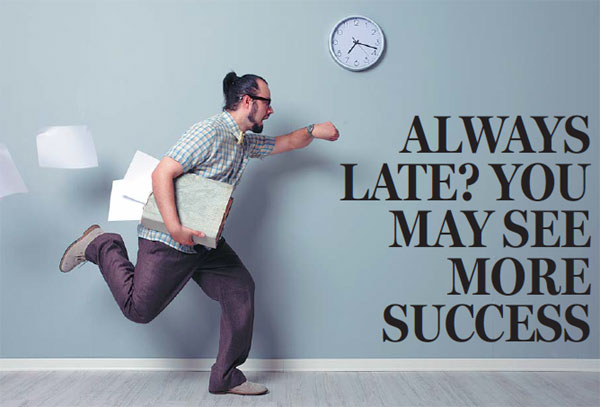Always late? you may see more success
By Rachel Matthews (China Daily) Updated: 2017-06-07 07:21总是迟到的人会更成功?
We all know someone who's always late. If we're meeting up with them, we'll deliberately fib about the time ("See you there at 7:30 pm!" when the table is booked for 8 pm). The thought of them getting to the office on time is unfathomable, and they always almost miss the train.
That person, however, is not me.
If I'm seeing a friend, I'll leave 10 minutes earlier than needed and be at the station half an hour before my train departs, with my tickets already picked up. If I have to get up early for a flight then my alarm will go off an hour earlier, just in case I don't get up straight away.
But, of course, such extreme measures will be for nothing. Because, more often than not, the pal I'm meeting or the person I'm traveling with will be late.
I'll stand waiting in the cold, trying to kill time in some of National Rail's finest establishments. Or I will have jumped out of bed as soon as my unnecessarily early alarm goes off, only to spend the rest of the day trying not to fall asleep.
The thought of being late fills me with such dread that by the time I'm where I need to be, my mind is so distracted with counting the minutes that I'm not fully engaged. And, God forbid, if I am late? I'm riddled with guilt.
So it's no wonder that studies have revealed those people who are regularly late are more optimistic, creative and less prone to stress.
Diana Delonzor, a time-management speaker, explains in her book, Never Be Late Again: "Many late people tend to be both optimistic and unrealistic, and this affects their perception of time. They really believe they can go for a run, pick up their clothes at the dry cleaners, buy groceries and drop off the kids at school in an hour."
A study by Jeff Conte, an associate psychology professor at San Diego State University, which claims that people who are always late have a "Type B" personality, supports this. One of the findings about a Type B person was that they really do perceive time differently, proven by an experiment on "Type A" and Type B people. They were made to guess how long they thought a minute was: Type A averaged guesses of 58 seconds, whereas Type B answered 77 seconds.
For every minute of the day Type B people seemingly believe they have an extra 17 seconds, so it comes as no surprise that they're late. With these extra seconds, their minds are free from time constraints, leaving room for creative thinking.
Compared to the hours I have wasted by being early, combined with the minutes I spend rushing out of the house so as to be on time, I can't help but wish I was a Type B.
It's always thought that by being early you can get more done, but in fact it is those who are late who seem to be getting the most out of their day. Optimism has also been proven to help you live longer ... giving you even more time to be late.
Tomorrow I might just get to work a bit late. Maybe.
我们都知道有些人总迟到。如果要和他们会面,我们会故意把约定时间说得早一点儿(“晚上七点半见!”,而实际上跟餐厅订的是八点)。要让这种人准时出现在办公室是不可想象的,他们几乎总是赶不上火车。
不过,我不是那样的人。
如果去见朋友,我会比需要的时间早10分钟出门。我也会在已经取好票的情况下提前半小时到达火车站。如果我必须早起赶飞机,那么我的闹钟会提早一个小时响,以防自己不能马上起床。
不过,这些非常措施往往毫无意义,因为我要去见的或者跟我一起去旅行的那个人通常会迟到。
我会被冷落在那里干等,不得不在车站的一些精美商店里转悠,消磨时间。或者,我会在上得过早的闹铃一响时,就从床上一骨碌爬起来,结果接下来的一整天就得使劲撑着不让自己打盹睡着。
迟到的焦虑会让我感到恐惧,以至于当我到了约定的地方,我的脑子里还在算着时间而无法集中精力做事。天哪,要是我真迟到了呢?我会充满内疚。
难怪研究表明,那些经常迟到的人会更乐观、富有创造性、压力感小。
戴安娜德伦佐是一位时间管理演讲者,她在《别再迟到》这本书中写到:“很多迟到的人往往乐观而又不切实际,这影响了他们的时间观念。他们真的认为他们可以在一小时内做完这样多的事:跑步锻炼,到干洗店取衣服,买日常用品,送孩子去上学。”
圣地亚哥州立大学的心理学副教授杰夫孔蒂在其一项研究中指出,总是迟到的人有“B类”人格,这也证实了德伦佐的观点。这项研究的一个发现是,在对“A类”和B类人的测试中,B类人对时间的感受的确异常。实验要求他们去感受一分钟的长度:A类人的感觉一般是58秒,而B类人则是77秒。
在B类人那里,每一分钟似乎都额外增加了17秒。如此,他们迟到也就不足为奇了。有这额外的十几秒,他们的头脑能摆脱时间的束缚,得以进行创造性的思考。
(本段的翻译有奖征集中)
人们通常认为,赶早不赶晚,做事成效更高,但实际上,似乎是那些惯于迟到的人得到的好处最多。这种人乐观,也因此更长寿……这又给了他们更多可以迟到的时间。
明天我也许会晚点儿去上班。只是也许吧。
翻译高手:请将蓝框标注内容翻译为中文,在6月12日中午12点前发送至youth@chinadaily.com.cn 或“中国日报读者俱乐部”公众服务号,请注明姓名、学校、所在城市、联系方式(电邮或电话)。最佳翻译提供者将获得精美礼品一份,并在周三本报公众号中发布。
上期获奖者:江西南昌 南昌师范学院 俞红枫

- 'Cooperation is complementary'
- Worldwide manhunt nets 50th fugitive
- China-Japan meet seeks cooperation
- Agency ensuring natural gas supply
- Global manhunt sees China catch its 50th fugitive
- Call for 'Red Boat Spirit' a noble goal, official says
- China 'open to world' of foreign talent
- Free trade studies agreed on as Li meets with Canadian PM Trudeau
- Emojis on austerity rules from top anti-graft authority go viral
- Xi: All aboard internet express











